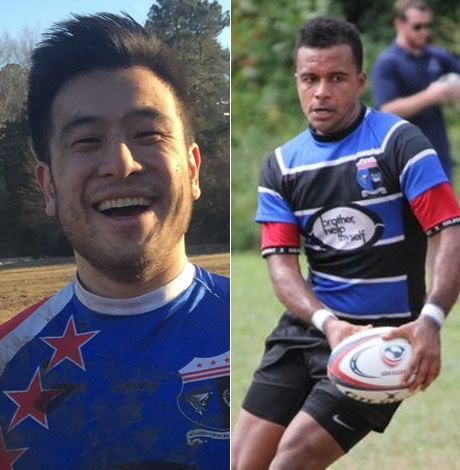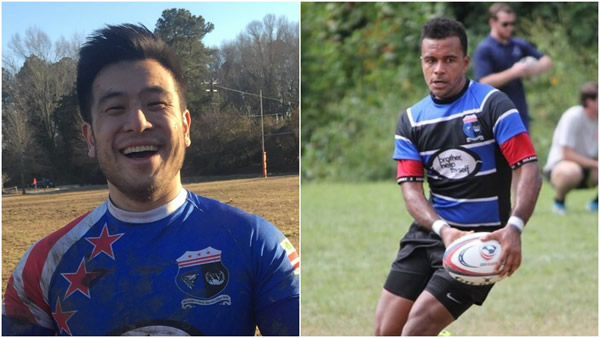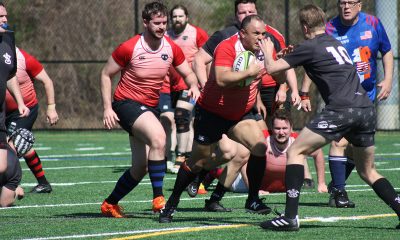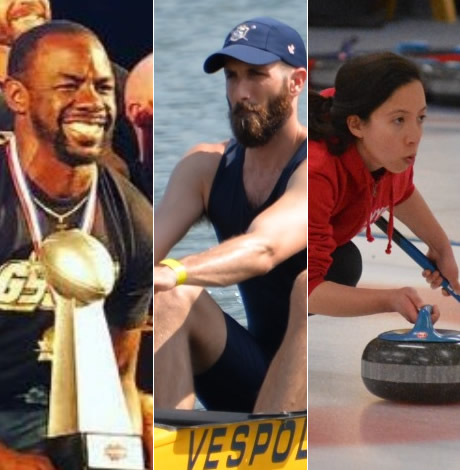Sports
All Star spotlight: Washington Renegades
Straight and gay players find challenge, athletics with local team


Haroon Chang (left) and Logan Cotton. (Chang photo courtesy Chang; Cotton photo courtesy Jill Williamson Photography)
The ongoing All Star series in the Washington Blade features players from sports teams in D.C. who welcome players regardless of sexual orientation, race or ethnicity. This week we meet two players from the Washington Renegades rugby team, one gay and one straight.
The Washington Renegades field competitive sides in the Mid-Atlantic Conference of USA Rugby. They recently sent three teams to the Bingham Cup in Amsterdam with all three squads reaching the semi-finals of their respective divisions. The Blues team won the Bingham Bowl beating the San Francisco Fog 20-0 in the final.
While completing his degrees at the University of Texas at Dallas, Haroon Chang attended a Halloween party hosted by a rugby team. He went to one of their practices and fell in love with the sport.
Growing up in Taiwan, Chang played a little basketball but was mostly focused on academics. His family moved to Dallas right before he started his college education. After graduation, he eventually moved to D.C. in 2012 because he wanted to see more of the country. A quick internet search led him to the Renegades.
“I didn’t know anyone when I moved here and I was looking to meet people and join a community,” Chang says. “I love rugby because it is physically demanding and a good workout. The sport has offered me a sense of family and brotherhood.”
Chang plays both inside and outside centre positions on the Renegades Reds team and last month competed in his second Bingham Cup in Amsterdam. Along with local league play, he has also traveled to tournaments with his teammates in Charlotte, Seattle and Nashville.
“It is amazing to play against teams from all over the world. On the field everyone is trying to win, but off the field we are a family,” Chang says. “It’s great reconnecting with other players at these tournaments. I am a little sad at the end because I wish it would keep going.”
The Renegades play rugby sevens in the summer but Chang, who works as a CPA, will be taking the summer off to catch up with friends. He will be back for the Renegades competitive match schedule in the fall.
“This is a good mix of gay and sports for me. We all play the sport because we love it and we come to the pitch to play,” Chang says. “Team means everyone, gay and straight.”
Rugby makes the world seem a little less big for Logan Cotton. After moving to D.C. in the fall of 2015, he posted on Facebook for rugby recommendations. A friend from college knew somone dating a guy on the Renegades and he signed on to play.
“The Renegades are committed to inclusion and I find that affirming and positive,” says Cotton, who is straight. “No one is beating their chest and there is no toxic masculinity. It’s super refreshing.”
Cotton grew up in Chicago and competed in soccer and swimming. He switched over to football while in high school and his first step into club rugby was while he was attending Tufts University. It was also at Tufts where he evolved to an inclusive mindset through his work at their LGBT center.
“Seeing it manifest in a new context (by playing sports on an LGBT-friendly team) is a good thing. Heteronormativity exists in all sports, but the Renegades have created a positive echo chamber and excel as stewards of the game,” Cotton says. “You can be great at the sport you are playing and still be better angels of our nature.”
Cotton’s path to D.C. was by way of work with Teach for America in Houston. He is now working as a federal consultant for Deloitte and geeks out over things like zoning, street development and when the expertise of the private sector and the government sector complement each other.
He plays as a scrum-half on the Renegades Blues team and missed the recent Bingham Cup in Amsterdam because LSATs (law school admission tests) were on the same weekend. He did play at the international event in Nashville in 2016 and welcomes all experiences with new cultures.
“The more you encounter people from around the world, the more you are growing your ability for empathy and compassion,” Cotton says. “Multiculturalism makes bonds across lines of differences. You be you, and I’ll be me.”
Cotton will be managing the Renegades sevens season this summer and is looking forward to helping players further their development.
“Complete rookies can become a positive factor for any of our teams. The Renegades give everyone an opportunity to improve and people are cheering you on through the process,” Cotton says. “Sports should be about ennobling human beings and pushing us away from our lizard base instincts.”

More than a dozen LGBTQ athletes won medals at the Milan Cortina Winter Olympics that ended on Sunday.
Cayla Barnes, Hilary Knight, and Alex Carpenter are LGBTQ members of the U.S. women’s hockey team that won a gold medal after they defeated Canada in overtime. Knight the day before the Feb. 19 match proposed to her girlfriend, Brittany Bowe, an Olympic speed skater.
French ice dancer Guillaume Cizeron, who is gay, and his partner Laurence Fournier Beaudry won gold. American alpine skier Breezy Johnson, who is bisexual, won gold in the women’s downhill. Amber Glenn, who identifies as bisexual and pansexual, was part of the American figure skating team that won gold in the team event.
Swiss freestyle skier Mathilde Gremaud, who is in a relationship with Vali Höll, an Austrian mountain biker, won gold in women’s freeski slopestyle.
Bruce Mouat, who is the captain of the British curling team that won a silver medal, is gay. Six members of the Canadian women’s hockey team — Emily Clark, Erin Ambrose, Emerance Maschmeyer, Brianne Jenner, Laura Stacey, and Marie-Philip Poulin — that won silver are LGBTQ.
Swedish freestyle skier Sandra Naeslund, who is a lesbian, won a bronze medal in ski cross.
Belgian speed skater Tineke den Dulk, who is bisexual, was part of her country’s mixed 2000-meter relay that won bronze. Canadian ice dancer Paul Poirier, who is gay, and his partner, Piper Gilles, won bronze.
Laura Zimmermann, who is queer, is a member of the Swiss women’s hockey team that won bronze when they defeated Sweden.
Outsports.com notes all of the LGBTQ Olympians who competed at the games and who medaled.
Sports
US wins Olympic gold medal in women’s hockey
Team captain Hilary Knight proposed to girlfriend on Wednesday

The U.S. women’s hockey team on Thursday won a gold medal at the Milan Cortina Winter Olympics.
Team USA defeated Canada 2-1 in overtime. The game took place a day after Team USA captain Hilary Knight proposed to her girlfriend, Brittany Bowe, an Olympic speed skater.
Cayla Barnes and Alex Carpenter — Knight’s teammates — are also LGBTQ. They are among the more than 40 openly LGBTQ athletes who are competing in the games.
The Olympics will end on Sunday.
Sports
Attitude! French ice dancers nail ‘Vogue’ routine
Cizeron and Fournier Beaudry strike a pose in memorable Olympics performance

Madonna’s presence is being felt at the Olympic Games in Italy.
Guillaume Cizeron and his rhythm ice dancing partner Laurence Fournier Beaudry of France performed a flawless skate to Madonna’s “Vogue” and “Rescue Me” on Monday.
The duo scored an impressive 90.18 for their effort, the best score of the night.
“We’ve been working hard the whole season to get over 90, so it was nice to see the score on the screen,” Fournier Beaudry told Olympics.com. “But first of all, just coming out off the ice, we were very happy about what we delivered and the pleasure we had out there. With the energy of the crowd, it was really amazing.”
Watch the routine on YouTube here.
-

 India4 days ago
India4 days agoActivists push for better counting of transgender Indians in 2026 Census
-

 Advice4 days ago
Advice4 days agoDry January has isolated me from my friends
-

 District of Columbia4 days ago
District of Columbia4 days agoCapital Pride reveals 2026 theme
-

 National4 days ago
National4 days agoAfter layoffs at Advocate, parent company acquires ‘Them’ from Conde Nast


















